Wounded Knee Massacre victims’ descendants urge feds to go beyond review, rescind soldiers’ honor medals at last
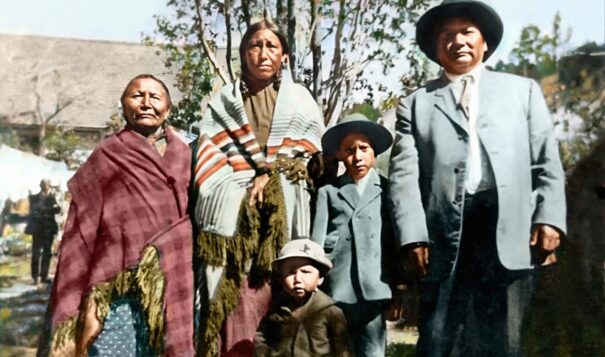
Stephan Curran colorized this 1930s photo showing the family of HAWK 1890 member Marlis Afraid of Hawk at Pine Ridge Reservation. Left to right, her great-grandmother “He Ska Win”/White Mountain Woman; grandmother Mabel Cetan Kokipa/Afraid of Hawk; grandfather Richard Cetan Kokipa/Afraid of Hawk; and their two sons, Bert and Cain Cetan Kokipa/ Afraid of Hawk. Grandfather Richard survived the massacre. (Family photo courtesy of Marlis Afraid of Hawk)
This story contains graphic material related to the Wounded Knee Massacre, including descriptions of violence and trauma that may be triggering for some readers. Please proceed with caution.
The Defense Department should go beyond its recent decision to “review” medals awarded to U.S. soldiers for the Wounded Knee Massacre, according to victims’ descendants. For more than a century, they have demanded revocation, an act they say would address widespread intergenerational trauma.
“I think it would really make an impact on the healing process, and the starting of a mourning process that (our elders) were denied in life,” Hoxwozhu (Hohwoju) Lakota Wounded Knee survivor descendant Violet Catches told Buffalo’s Fire. Catches, 74, a Lakota language teacher and author from Bridger, S.D., on the Cheyenne River Reservation, is active in a movement pressuring the government to revoke the medals.
Secretary of Defense Lloyd J. Austin III announced a review of the Medals of Honor “to ensure no awardees were recognized for conduct inconsistent with the nation’s highest military honor,” according to a July 24 news release. He directed the Undersecretary of Defense for Personnel and Readiness to convene a panel to “conduct an individualized assessment based on standards in effect during that period.”
Soldiers massacred Miniconjou Lakota Chief Spotted Elk and hundreds of his followers at Wounded Knee. Mistakenly known as Big Foot, he was leading them to safety from the military offensive during the bitter winter of 1890. At his camp on Wounded Knee Creek, the U.S. Army’s 7th Cavalry mowed down men, women and children, leaving them to freeze in the snow.
“I strongly believe those medals were wrongfully awarded,” Calvin Spotted Elk told Buffalo’s Fire. “All this should have been resolved way back then, but the Army was not doing it right. In fact they were drunk; my research tells me there was a keg of whiskey, maybe two, involved.”
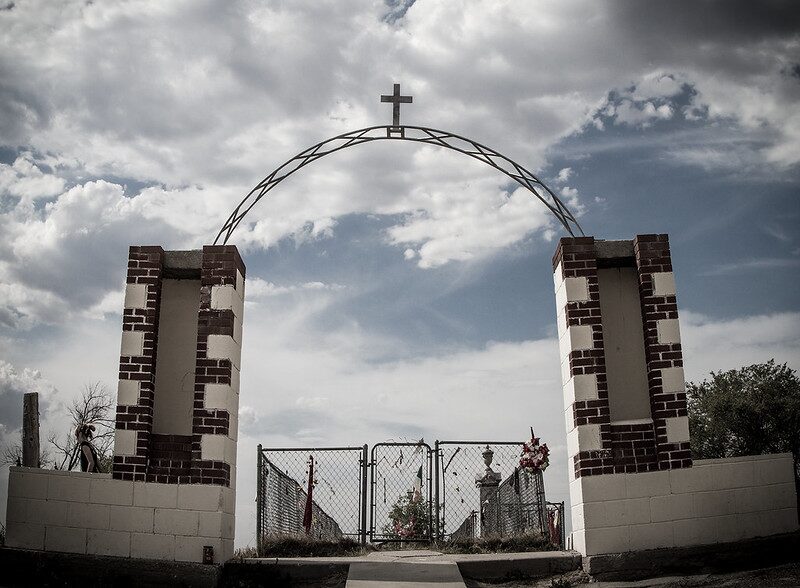
Wounded Knee Massacre Cemetery and Mass Grave: A memorial of the Wounded Knee Massacre sits on the Pine Ridge Reservation. (Photo Credit/ William O’Brien/Flickr, Creative Commons (CC BY-NC-SA))
Chief Spotted Elk’s great-great-grandson, he is a leader in the generations-long movement of Wounded Knee Massacre survivors, descendants, and others to revoke the medals. Participants see the action as a tangible step toward righting the historic wrongs of the U.S. government against Native Americans.
The DOD panel will submit a report by mid-October. Austin will then present his recommendations to the President. The Executive Branch has conducted reviews previously to determine whether awards should be rescinded. After a 1916 review, it revoked 911 Medals of Honor, according to the Defense Department release.
The United States has issued over 3,500 Medals of Honor, with about 400 going to soldiers who participated in campaigns against Native Americans, according to the New York Times: the government has never revoked a medal awarded for service in the Indian campaigns.
The massacre occurred on Dec. 29, 1890, when the Cavalry was taking into custody the mostly unarmed members of Spotted Elk’s encampment. A shot rang out and his followers began to fall to heavy artillery. More than 250 Lakota died and 41 incurred wounds, according to some estimates. Others say as many as 300 Lakota died, and around 30 soldiers, many from friendly fire.
“I have never heard of a more brutal, cold-blooded massacre than that at Wounded Knee,” wrote Maj. Gen. Nelson A. Miles, an Army commander in the Indian Wars, in a letter to a fellow officer on Nov. 20, 1891. “About two hundred women and children were killed and wounded; women with little children on their backs, and small children powder burned by the men who killed them being so near as to burn the flesh and clothing with the powder of their guns, and nursing babes with five bullet holes through them.”
Calvin Spotted Elk has been active in the “Remove the Stain” movement to rescind the medals since childhood, when his parents took him to Wounded Knee Survivor meetings. For him, the miscarriage of justice is particularly bitter given the sacrifice of his father, Jasper Spotted Elk, who enlisted in the U.S. Army Airborne after the WWII attack on Pearl Harbor.
He was wounded and nearly killed but earned no medal or pension, despite numerous appeals. He told his sons not to join the military and said, “No, you boys don’t deserve that. I already fought for your freedom.”
Pushing for Political Change
Another military veteran active in the movement to rescind the medals, Oscar “OJ” Semens, said he joined when then-President Donald Trump made a joke about Wounded Knee as he mocked Sen. Elizabeth Warren, calling her “Pocahontas.”
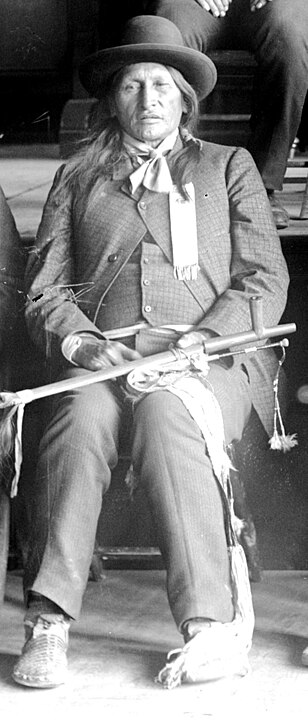
A headman of the Miniconjou Lakota, Chief Spotted Elk, also known as Big Foot, posed for this 1888 photo. (Photo credit/ T. W. Smillie, Public Domain/Wikimedia)
“And what that told me was he had no idea what he was talking about, as far as bringing in a massacre like that to make a joke,” said Semens. “And I knew that we needed to do something to right the wrong.”
A citizen of the Sicangu Oyate and co-director of the nonprofit advocacy group Four Directions, Semens has worked closely with descendant groups. They wrote a letter to Trump and to the Defense Department. Like others before them, they requested that the medals be rescinded. They are pushing “Remove the Stain” legislative resolutions, led by former Rep. Debra Haaland and Sen. Elizabeth Warren in Congress, and by former Sen.Troy Heinert in the South Dakota Legislature.
They organized a series of forums beginning in 2019 asking candidates from the President on down their positions on the medals, as well as on the crisis of Missing and Murdered Indigenous Women. Then-presidential candidate Joe Biden responded that no honors should have been granted for a massacre. Kamala Harris, also a candidate for president at the time, responded in kind. The Trump campaign never responded.
Heinert, Sicangu Lakota citizen of the Rosebud Sioux Tribe, sponsored the Remove the Stain resolution in that state’s senate.
“Honestly, we had to educate the legislature,” Heinert told Buffalo’s Fire. “I don’t think many of them understood how that has affected us as a people for so long. And then many of them didn’t know that there were medals of honor given.”
For Heinert, this has been personal, as well as political. “There’s still this little bit of sadness that somebody was honored for killing our ancestors…. Rescinding these medals would give us a chance to continue that journey of healing that we’ve been fighting for a long time.”
Voices of HAWK 1890
Spotted Elk and Catches joined other members of HAWK 1890 (Heartbeat At Wounded Knee, a group of survivor descendants and allies), in a meeting via Zoom with Buffalo’s Fire.
Catches was initially hopeful when she heard the news of the Defense Department review. She became skeptical upon reading the letter, fearing the panel might not fully acknowledge the massacre’s nature.
“But then I prayed about it, and I feel good. I’m hopeful that we will see these revoked in my lifetime, and we can start telling a different story to our children,” she said.
Marlis Afraid of Hawk’s grandfather, Wounded Knee survivor Richard Afraid of Hawk, was among those who began the effort to rescind the medals in the early 1900s. That puts her in the third generation of survivors who have fought for justice.
“I promised my father amongst other elders that handed this fight to us, and they made their journeys not knowing what would happen, but I reassured them that we would somehow make it right,” said Afraid of Hawk.
She prays that the members of the review panel “will have a good heart to review each of these medals that were given to the Seventh Cavalry members, and that Tunkashila will let the reviewers see that what happened was wrong.”
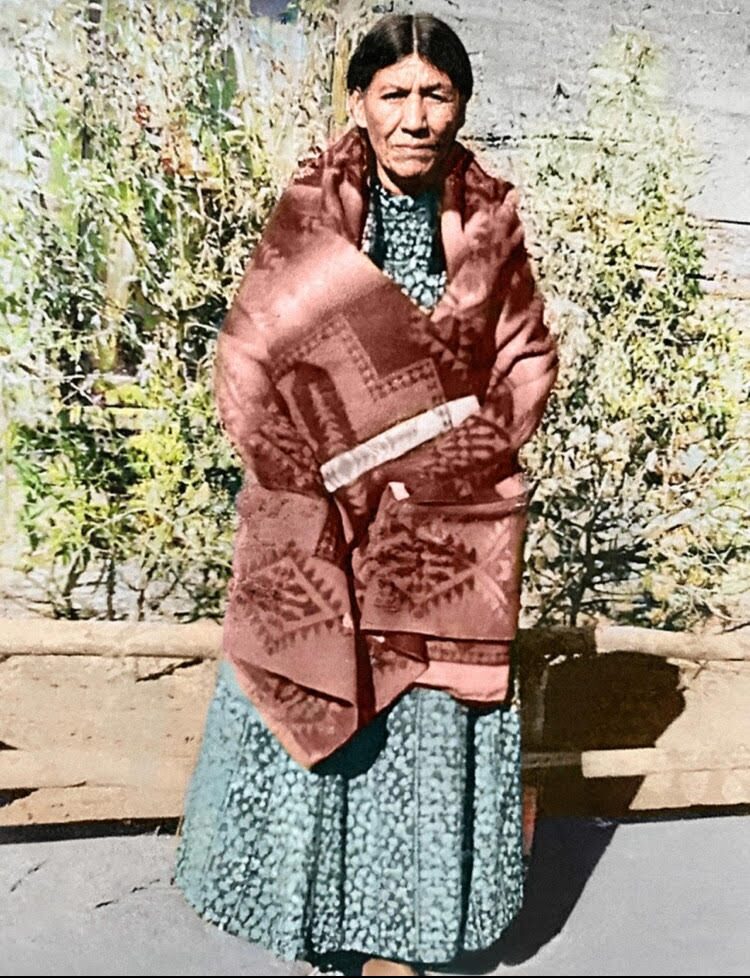
This photo, colorized by Stephan Curran, shows Alice Ghost Horse-War Bonnet, great-grandmother of HAWK 1890 co-chair Manny Iron Hawk. She was a young girl at the time of Wounded Knee, and she survived. (Photo credit/ Family photo courtesy of Manny Iron Hawk)
Manny and Renee Iron Hawk said the campaign to revoke the medals is part of a much bigger picture. They pointed out that the effects of the massacre and other similar events continue to ripple through their communities today. Unresolved trauma manifests in cycles of violence, addiction, and social challenges that persist across generations, said Renee, a former social worker.
“If they do rescind, it’ll be a longtime justice coming,” said Manny, co-chairman of HAWK 1890, great-great-grandson of Ghost Horse, who was killed during the Wounded Knee Massacre. “We are going to have a ceremony, and I’m pretty sure we’ll send our relatives on a journey home.”
Also present was Michelle Wilder, Spotted Elk’s wife and the mother of their daughter, Liliienne. Together she and Spotted Elk wrote a letter in 2013 to then-President Barack Obama, “No Medals for Massacre: Close the Open Wound of Wounded Knee.” That became a petition garnering over 17,000 signatures. They also compiled years of research on the medal recipients and highlighted the flawed process of awarding them, creating a database for use by descendants only.
Wilder highlighted the connection between past injustices and current societal issues, such as mass shootings and misinformation.
“When truth is no longer indistinguishable from lies, then all sorts of other things begin to collapse, and I think that is really at the heart of so many of the problems on the reservations – that people are living, knowing what was true, and yet their pain is minimized,” Wilder said. “The majority of the people don’t even know anything about this out there in this country, because so much of it was hidden from popular history.
“And so when you acknowledge people’s pain, when you acknowledge and you preserve the truth, then you honor the victims. And those things are extremely important for anyone, whether it’s people today who are dealing with the pain of their relatives who have been shot in a mass shooting, or whether it was what happened at Wounded Knee.”
Calming the restless spirits
Violet Catches has carried the stories with her since childhood, and has long seen it as her responsibility to keep them alive. She grew up hearing her own family’s story from her grandmother, Sarah “Jennie” Blue Hair-Holy. Sarah’s husband and Violet’s grandfather, Leon Holy, was one of four young boys who managed to escape from the brutal scenes unfolding in front of them. The boys rescued a toddler who had been shot and carried him with them, running by night and hiding in plum thickets by day, until they reached the safety of Bridger.
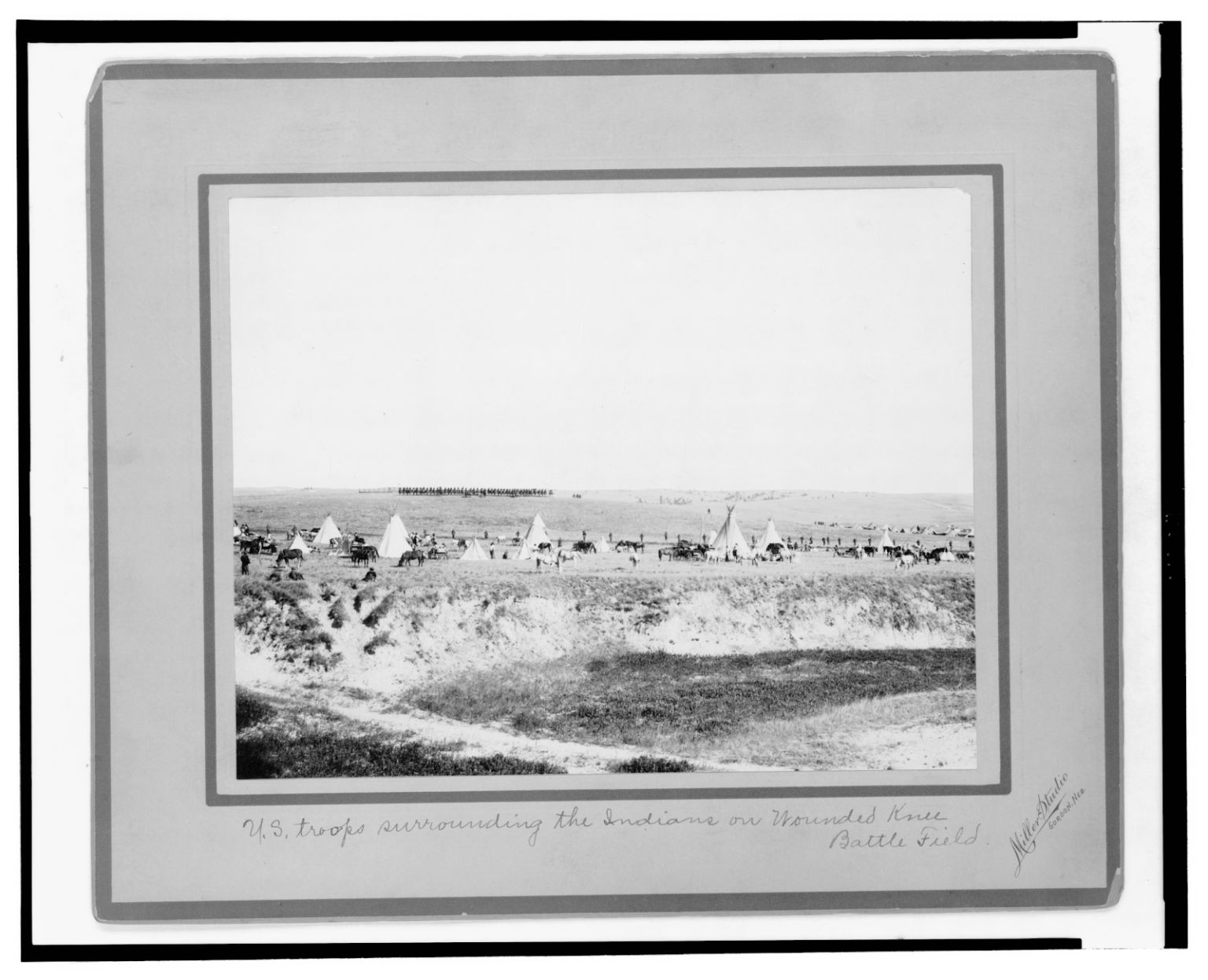
U.S. troops surrounding the Indians on Wounded Knee battle field, published c.Nov. 10, 1913. (Photo Credit/ James A. Miller, Library of Congress)
Like the other grandmothers of her community, Violet’s grandmother would tell the story in a low voice, often after sunset, and it would often bring her to tears. The massacre’s history has been an integral part of the community’s identity, with multiple families connected to the events. Even though it was 134 years ago now, she said, it still feels very present, especially for her grandmother; it was her own husband who lived through these things.
“We carry the memory of what happened, from childhood,” she said. “We can’t ever forget them.” Rescinding the medals would bring some form of justice, Catches says, and would help calm the restless spirits of the massacre victims.
She thinks of her mother, who was integrally involved in the movement, because her own father was one of those young boys who escaped the massacre. “Maybe once this happens we in the physical world can come to Wounded Knee with news of the rescinded Medals of Honor,” she said, “and offer some kind of peace for them in prayer.” she said. “Maybe that’ll make a difference to them.”
References:
Soldiers’ consumption of hard liquor before the Wounded Knee Massacre was reported, among others, by Dee Brown, Bury My Heart at Wounded Knee: An Indian History of the American West (Holt, Rinehart & Winston, 1970), Chapter 19, “Wounded Knee.”
Joseph Clark, “Austin Orders Review of Wounded Knee Medals,” DOD News, July 24, 2024.
Memorandum for Secretary of the Army, Under Secretary of Defense for Personnel and Readiness, General Counsel of the Department of Defense. “Review of Medals of Honor Awarded for Actions Related to the Engagement at Wounded Knee Creek, on December 29, 1890.” July 19, 2024.
Dee Brown, Bury My Heart at Wounded Knee: An Indian History of the American West (Holt, Rinehart & Winston, 1970), Chapter 19, “Wounded Knee.”
Mark Walker, “Tribes Want Medals Awarded for Wounded Knee Massacre Rescinded,” New York Times, April 23, 2021.
Nelson A. Miles to George W. Baird, November 20, 1891, Baird Collection, WA-S901, M596, Western Americana Collection, The Beinecke Rare Book and Manuscript Library, Yale University, New Haven, Connecticut, as cited in a research database compiled by Michelle Wilder and Calvin Spotted Elk.
Rep. Johnson, Tim. H.Con.Res.386 – “To acknowledge the 100th anniversary of the tragedy at Wounded Knee Creek, State of South Dakota, December 29, 1890, wherein soldiers of the United States Army 7th Cavalry killed and wounded approximately 350-375 Indian men, women, children of Chief Big Foot’s band of the Minneconjou Sioux, and to recognize the Year of Reconciliation declared by the State of South Dakota between the citizens of the State and the member bands of the Great Sioux Nation.” Congressional Record, U.S. Congress, 1990.
The post Wounded Knee Massacre victims’ descendants urge feds to go beyond review, rescind soldiers’ honor medals at last first appeared on Native Sun News Today.
